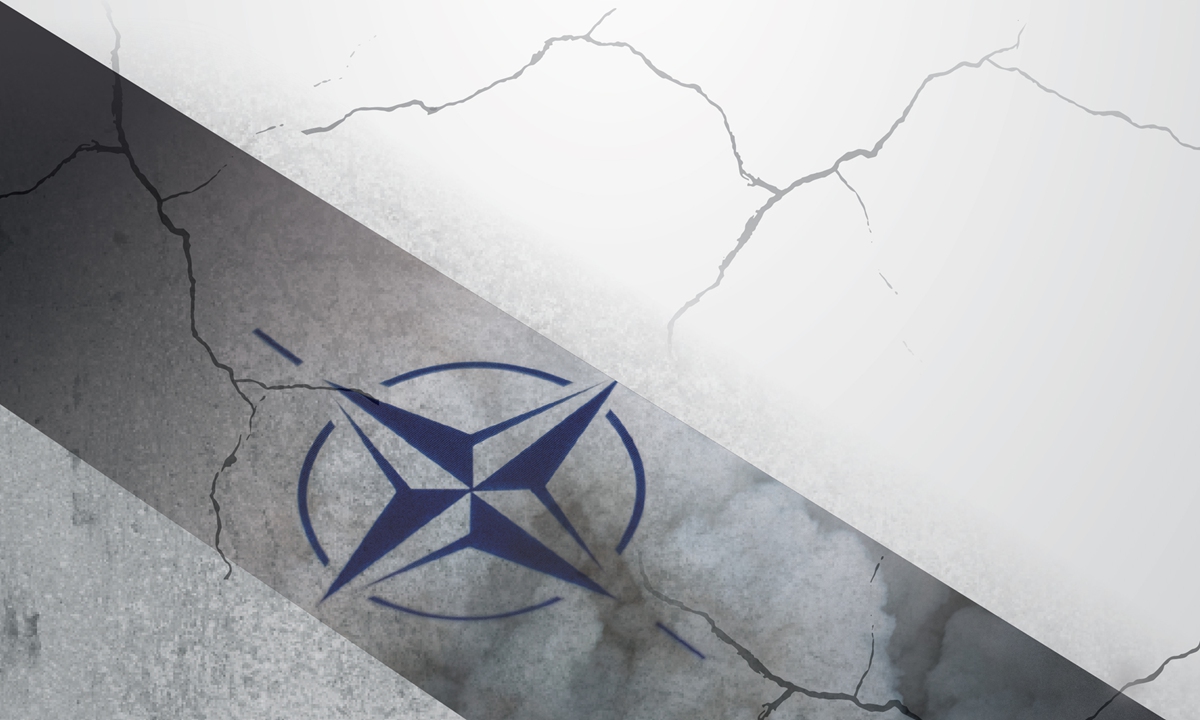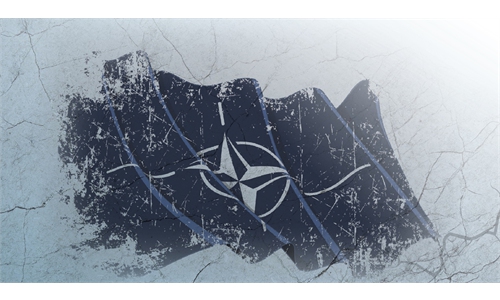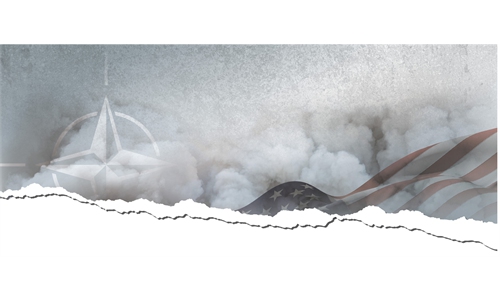
Photo: AFP
Editor's Note:
April 4, 2024 marks the 75th anniversary of the founding of NATO. As a product of the Cold War, NATO should have been disbanded, but over the years, it has served as a war machine and facilitated US hegemony. The Global Times talked to a number of experts and scholars to reveal how the US exploits NATO to serve for its geopolitical purposes and how NATO destabilizes the world, exacerbates nuclear threats and brings confrontation to Asia.
In the fourth interview of the series, Global Times (GT) reporter Wang Wenwen talked to Kate Hudson (Hudson), general secretary of the UK-based organization Campaign for Nuclear Disarmament (CND), about her concerns over NATO going global and its nuclear threat.
GT: As a product of the Cold War, how does the existence of NATO exacerbate the cold war atmosphere today?
Hudson: For us, NATO was an essential part of developing the hostile bipolar world that existed during the Cold War. After the end of the Cold War, the Warsaw Pact was dissolved, and it was the expectation of CND and many other people that NATO should be dissolved too, and there should be a new world order with a peace dividend, much greater mutual cooperation and an end to that kind of tension.
Unfortunately, that didn't happen. And from the mid 1990s, we saw the moves to expand NATO. NATO was very keen to integrate the countries of Central and Eastern Europe into NATO. And just a few days after Poland, Hungary and the Czech Republic joined NATO, they found themselves at war with the former Yugoslavia. Since then, we have seen continual expansion of NATO involvement in much wider wars.
Nowadays, we say that NATO is supposed to be North Atlantic, but it's actually gone global. We see NATO playing a negative and destabilizing role, contributing to global tensions. NATO is led by the US. Europe is part of it. Periodically we get called on to go and fight the US's wars and back up its foreign and defense policy.
GT: Your organization is campaigning for nuclear disarmament. One reason for your opposition to NATO is its nuclear impact. What nuclear threat does NATO pose to the world, especially against the backdrop of the ongoing Russia-Ukraine conflict?
Hudson: Three of NATO's members are nuclear weapons states - the United States, Britain and France. Obviously, the US arsenal is much bigger, but France and Britain are the countries that have nuclear weapons within Europe. There's also an additional category of NATO nuclear weapons located in Europe, which essentially belong to the US. Those nuclear weapons are currently being upgraded by the US. The US is bringing them back to Britain as well, and that is contributing to the tensions and increased risk of nuclear conflict with Russia. Russia has now located nuclear weapons in Belarus, in response to these developments.
Since the start of the Russia-Ukraine war, we have been warning about the dangers of the expansion of this war. Everyone knows that NATO states are sending weapons to Ukraine. In the event that NATO becomes directly involved, it will be a war between Russia and NATO, both of whom are nuclear armed. That would be a very disastrous situation. It's hard to see how that wouldn't result in a nuclear war.
GT: Do nuclear weapons provided by the US make Europe more secure or less secure?
Hudson: Much less secure. We have said very clearly that having nuclear weapons makes us a target, because when there are nuclear weapons in a particular base, if a nuclear war is coming, it is an obvious target to knock out that base and knock out those weapons before they can be fired somewhere else.
Having nuclear weapons in Europe makes those bases and countries a target. That's one reason why we have a campaign at the moment here in Britain against the return of US nukes. We got rid of them in 2008. Now, they want to bring them back to this same base at RAF Lakenheath in Suffolk, East Anglia. That will just make Lakenheath a target. We plan to get rid of them again.
GT: NATO has viewed China as a security challenge. The NATO chief also linked what's happening in Ukraine to the Taiwan question. What do you think of NATO's moves against China in recent years?
Hudson: In the early 1990s, the US administration published the Wolfowitz Doctrine, which determined that they wish to remain the single superpower in the world after the end of the Soviet Union and they also wish to prevent the rise of an equivalent power. That doctrine has prevailed ever since.
It seems that many observers have been concerned about the great economic rise of China, China becoming a very powerful and prosperous country and raising millions of people out of poverty and becoming a big economic player in the world at a time when the US has become increasingly indebted.
The US has been looking for ways to diminish or contain the growth of China. One of the ways it has been doing that appears to be the military expansion of the US and NATO into alliances in Asia. One example of this is the AUKUS treaty, which is drawing Australia further into the US military framework, whereas previously Australia had constructive relations with China. But now, this kind of military element has come in. The US and UK are helping Australia to have nuclear-powered submarines. There's an escalating tension around military stuff. The underlying reason for this is the US's long-run concern about China as a very strong emerging economic force.
GT: You have been engaged in anti-war campaigns nationally and internationally for years. Do you feel that anti-war campaigns are more necessary but more difficult in today's world?
Hudson: They're more necessary. At the moment, there are two major conflicts going on, one is the war in Ukraine and the other is the attack on Gaza by Israel. Those are two very risky situations in terms of nuclear war. Furthermore, there is an increasing narrative here in the "West" that there is a rise of "authoritarian" states that are warlike and will attack people, so we need to increase our military and go on the offensive to stop that. People buy into that to a certain extent.
With the war on Ukraine, for example, we are very opposed to that war. But we don't believe that Russia is planning to take back the former Soviet republics. We don't believe that Russia wants to invade Europe. We see the expansion of NATO into that region and the political interference by the West in Ukraine as the preeminent factor in that war.
But nevertheless, there has been a surge here in support of NATO by people who do not understand or do not want to understand what the reasons are for that war and how it should best be brought to an end. Some trade unions have asked, even urged, for more weapons to be sent to Ukraine.
In our view, that's just more workers being killed on both sides, and we continually urge for a cease-fire and a negotiated settlement. Sometimes our work is difficult, but peace and disarmament is our position. It is the right one, and we continue to maintain that position.


